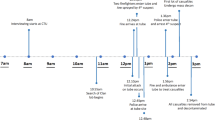Abstract
The objective of the present work is to build and implement a decision support system with the ability to prioritize certain teams for specific incidents taking into account the importance of each team that acts in case of emergency, the sequence of tasks that should perform all possible orders to be given. With such purpose, a collaborative estimation or forecasting technique that combines independent analysis with the maximum use of feedback was applied to build consensus among experts who interact anonymously (Delphi forecasting). The topic under discussion is distributed (in a series of rounds) between the participating experts who comment on it and modify the opinion(s) until a certain degree of mutual consensus is reached. In our case, the collection and summary of knowledge of a group of experts from a given area was done through various phases of questionnaires, accompanied byan organized feedback. Simultaneously, it was necessary to make a survey about the existing emergency teams, as well as of all possible tasks in case of emergency. With this purpose were held meetings with experienced individuals in emergency cases, some documents about some exercises performed were consulted, also direct observation of a simulation of a catastrophe exercise in which humanitarian aid is required allowed to collect and analyze some important data. The decision support system is not completed but we hope to have given an important contribution to its construction.
Access this chapter
Tax calculation will be finalised at checkout
Purchases are for personal use only
Similar content being viewed by others
References
Reuven, L., Dongchui, H.: Choosing a technological forecasting method. Ind. Manage. 37(1), 14–22 (1995)
Duuvarci, Y., Selvi, Ö., Günaydin, H.M., GüR, G.: Impacts of transportation projects on urban trends in İzmir, pp. 1175–1201, Digest 2008 (Teknik Dergi 19, Special Issue), December 2008
Powell, C.: The Delphi technique: myths and realities. Methodol. Issues Nurs. Res. 41(4), 376–382 (2003)
Marques, M., Elvas F., Nunes, I.L., Lobo, V., Correia, A.: Augmented reality in the context of naval operations. In: Ahram, T., Karwowski, W., Taiar, R. (eds.) IHSED 2018, AISC, vol. 876, pp. 307–313 (2019). https://doi.org/10.1007/978-3-030-02053-8_47
Nunes, I.L., Lucas, R., Simões-Marques, M., Correia, N.: Augmented reality in support of disaster response. In: Nunes, I.L. (ed.) Proceedings of Advances in Human Factors and System Interactions, AHFE 2017 Conference on Human Factors and System Interactions, Advances in Intelligent Systems and Computing, 17–21 July, AISC, vol. 592, pp. 155–167. Springer (2018). https://doi.org/10.1007/978-3-319-60366-7_15
Nunes, I.L., Lucas, R., Simões-Marques, M., Correia, N.: An augmented reality application to support deployed emergency teams. In: Bagnara, S., Tartaglia, R., Albolino, S., Alexander, T., Fujita, Y. (eds) (eds.) Proceedings of the 20th Congress of the International Ergonomics Association (IEA 2018), Advances in Intelligent Systems and Computing, 26–30 August, AISC, vol. 822, pp. 195–204. Springer (2019). https://doi.org/10.1007/978-3-319-96077-7_21
Simões-Marques, M., et al.: Empirical studies in user experience of an emergency management system. In: Nunes, I.L. (ed.) Proceedings of Advances in Human Factors and System Interactions, AHFE 2017 Conference on Human Factors and System Interactions, Advances in Intelligent Systems and Computing, 17–21 July 2017, pp. 97–108. Springer (2018). https://doi.org/10.1007/978-3-319-60366-7
Azevedo, S.G., Carvalho, H., Machado, V.C.: Agile index: automotive supply chain. World Acad. Sci. Eng. Technol. 79, 784–790 (2011)
Azevedo, S.G., Govindan, K., Carvalho, H., Machado, V.C.: Ecosilient index to assess the grenness and resilience of the up stream automotive supply chain. J. Clean. Prod. 56, 131–146 (2013). https://doi.org/10.1016/j.jclepro.2012.04.011
Fraga, M: A economia circular na indústria portuguesa de pasta, papel e cartão. Master Thesis, FCT, Universidade Nova de Lisboa, Almada (2017)
De Vet, E., Brug, J., De Nooijer, J., Dijkstra, A., De Vries, N.K.: Determinants of forward stage transitions: a Delphi study. Health Educ. Res. 20(2), 195–205 (2005)
Gunaydin, H.M.: Impact of information technologies on project management functions. IIT Doktora Tezi, Chicago, USA (1999)
Adler, M., Ziglio, E.: Gazing Into the Oracle: The Delphi Method and its Application to Social Policy and Public Health. Kingsley Publishers, London (1996)
Wissema, J.G.: Trends in technology forecasting. R & D Manag. 12(1), 27–36 (1982)
Acknowledgements
This work was supported by Portuguese funds through the Center for Computational and Stochastic Mathematics (CEMAT), The Portuguese Foundation for Science and Technology (FCT), University of Lisbon, Portugal, project UID/Multi-/04621/2013, and Center of Naval Research (CINAV), Naval Academy, Portuguese Navy, Portugal.
Author information
Authors and Affiliations
Corresponding author
Editor information
Editors and Affiliations
Rights and permissions
Copyright information
© 2020 Springer Nature Switzerland AG
About this paper
Cite this paper
Nunes, I.L., Calhamonas, G., Marques, M., Teodoro, M.F. (2020). Building a Decision Support System to Handle Teams in Disaster Situations - A Preliminary Approach. In: Madureira, A., Abraham, A., Gandhi, N., Varela, M. (eds) Hybrid Intelligent Systems. HIS 2018. Advances in Intelligent Systems and Computing, vol 923. Springer, Cham. https://doi.org/10.1007/978-3-030-14347-3_54
Download citation
DOI: https://doi.org/10.1007/978-3-030-14347-3_54
Published:
Publisher Name: Springer, Cham
Print ISBN: 978-3-030-14346-6
Online ISBN: 978-3-030-14347-3
eBook Packages: Intelligent Technologies and RoboticsIntelligent Technologies and Robotics (R0)




